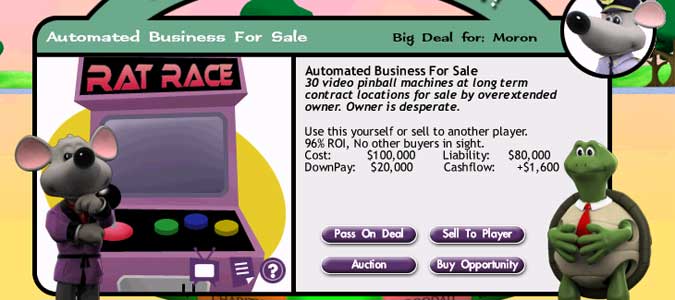This page may contain one or more affiliate links, which means that if you purchase a product through that link, I may receive compensation. The links will be identified with the text "affiliate link". Click to learn more.
If you are reading this, surely you have read one of Robert Kiyosaki’s books such as Rich Dad Poor Dad…. and the advertisement in the back of it to buy the board game Cashflow 101 or Cashflow 202. I managed to borrow the e-game software version from a friend to dodge the high price. Since then, an online version had become available, and you are probably looking for some game tips and strategies.
The strategy for Cashflow 101 is simple. To get out of the rat race, you can do two things. Buy stock cheap to sell higher later, or build up rent property to perhaps sell later as well.
To do these things in the game, you often need a bank loan. This is no big deal, however. After a few turns with rental properties, such as starter houses or apartments, you will be able to pay off any debt. To buy stocks cheap, just look at the high and low points. If it is selling on the low side, spend every dime of your cash on hand on that stock (you will make more money later). Then, when the price goes up, sell all the stock.
The strategy for Cashflow 202 is the same for Cashflow 101, except you need to sell stock immediately after the price rises.
When playing the game, a good tip is to avoid anything with low or negative cashflow. Never lend money to family. Cashflow 101 (and 202) encourages you to donate money to charity, but I disagree. The benefit is that you get to roll with multiple dice, but this only becomes useful after you get out of the rat race. At that point in the game, you can use the extra dice to reach your dream goal faster.
Cashflow 101 is not that hard to find (affiliate link) nor hard to play because it represents only a bull market. Only good stuff happens, basically. Compared to Cashflow 202, which is both a bull and a bear market, things can go sour fast, which makes it a much more challenging game. It also has doodads that damage your regular income, such as car maintenance and cellphone bills.
In conclusion, the board game is an excellent tool for learning about investing and financial literacy in a fun and engaging way. Created by Robert Kiyosaki, author of the bestselling book ‘Rich Dad Poor Dad,’ this game allows players to experience the real life challenges and rewards of managing money and building wealth.
By playing Cashflow, individuals can escape the rat race and learn valuable lessons about the stock market, real estate, and passive income. It is a fast track to understanding the principles of financial freedom and provides a safe environment to practice making investment decisions. Whether you are a seasoned investor or just starting to learn about money management, Cashflow 101 is a must-play board game for anyone looking to break free from the cycle of living paycheck to paycheck.

